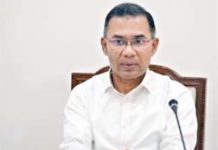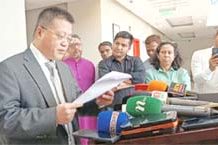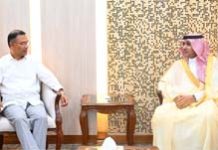C T Online Desk: He stresses legal procedures regarding Hasina’s extradition.
Chief Adviser Dr Muhammad Yunus of the interim government stated that no decision has been made yet regarding the tenure of the interim government or the timing of the next election.
In an exclusive interview with Voice of America (VOA) Bangla following his speech at the United Nations General Assembly on 27 September, Yunus said, “The government will have to decide when to determine its tenure. Until they announce it, there is no defined period for the government.”
The interview, published on Monday (September 30), came after significant political upheaval in Bangladesh. On 5 August, the then-Prime Minister Sheikh Hasina resigned and fled to India amidst a student-led mass uprising. Dr Yunus took over as the head of the interim government on 8 August, and tensions between Bangladesh and India have since been noticeable.
Regarding the potential extradition of Sheikh Hasina, Dr Yunus explained that the issue is a legal matter and that Bangladesh would pursue her return through proper legal channels. He emphasised that Bangladesh and India need to maintain close and harmonious relations, despite occasional tensions, particularly incidents at the border that have resulted in civilian deaths.
Speaking on the student movement, which played a key role in the uprising, Dr Yunus acknowledged that student representatives are part of the interim government. He also noted that young people are increasingly taking control in various sectors of society. When asked whether students are running the country, he replied, “It should be run by them. I’m not saying they are running it yet, but it should be left to the youth, as they are the ones shaping their future.”
The interim government’s controversial decision to grant military officers magisterial powers to restore law and order has drawn criticism. Dr Yunus explained that the move was necessary due to the police force’s diminished morale following its role in repressing the uprising. Despite deploying the Ansar force, law and order remained unmanageable, prompting the need for military intervention for two months.
BNP Secretary General Mirza Fakhrul Islam Alamgir criticized this decision, stating, “This authority should only be granted when the constitution has been severely violated, which has not yet occurred.” He added that this decision might create additional problems rather than solving them.
In response to questions about investigations into the killings during the uprising, Yunus assured that those responsible would be brought to justice, saying, “Justice will be served wherever a crime was committed. We cannot have justice for some and not for others.”
Dr Yunus also addressed the recent instability in the Chittagong Hill Tracts, expressing the government’s desire for peace across the country. He acknowledged that some situations were beyond the government’s immediate control but reaffirmed that any unrest would be dealt with responsibly.
On the Rohingya crisis, Yunus reiterated that Bangladesh would continue to follow international law regarding refugees. “We cannot close our doors when people seek refuge due to life-threatening circumstances,” he said, adding that the issue was being discussed in various international forums, including the United Nations.
As for constitutional reforms, Yunus criticised the previous government for its destruction of institutions, stating that the current government is working to rebuild the nation through commissions, including one focusing on constitutional issues.
The interim government’s ultimate goal is to complete necessary reforms and hand over power to an elected government, Yunus added.
Courtesy: VOA Bangla















